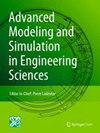Computational method for solving weakly singular Fredholm integral equations of the second kind using an advanced barycentric Lagrange interpolation formula
IF 3.2
Q3 MECHANICS
Advanced Modeling and Simulation in Engineering Sciences
Pub Date : 2021-06-29
DOI:10.21203/rs.3.rs-651030/v1
引用次数: 2
Abstract
In this study, we applied an advanced barycentric Lagrange interpolation formula to find the interpolate solutions of weakly singular Fredholm integral equations of the second kind. The kernel is interpolated twice concerning both variables and then is transformed into the product of five matrices; two of them are monomial basis matrices. To isolate the singularity of the kernel, we developed two techniques based on a good choice of different two sets of nodes to be distributed over the integration domain. Each set is specific to one of the kernel arguments so that the kernel values never become zero or imaginary. The significant advantage of thetwo presented techniques is the ability to gain access to an algebraic linear system equivalent to the interpolant solution without applying the collocation method. Moreover, the convergence in the mean of the interpolant solution and the maximum error norm estimation are studied. The interpolate solutions of the illustrated four examples are found strongly converging uniformly to the exact solutions.用改进的重心拉格朗日插值公式求解第二类弱奇异Fredholm积分方程的计算方法
在本研究中,我们应用一个先进的重心拉格朗日插值公式来寻找第二类弱奇异Fredholm积分方程的插值解。核在涉及两个变量的情况下被插值两次,然后被转换为五个矩阵的乘积;其中两个是单项基矩阵。为了隔离核的奇异性,我们开发了两种技术,这两种技术是基于对分布在积分域上的不同两组节点的良好选择。每个集合都特定于其中一个内核参数,因此内核值永远不会变为零或虚值。所提出的两种技术的显著优点是能够在不应用配置方法的情况下访问等价于插值解的代数线性系统。此外,还研究了插值解的均值收敛性和最大误差范数估计。发现所示四个例子的插值解强一致收敛于精确解。
本文章由计算机程序翻译,如有差异,请以英文原文为准。
求助全文
约1分钟内获得全文
求助全文
来源期刊

Advanced Modeling and Simulation in Engineering Sciences
Engineering-Engineering (miscellaneous)
CiteScore
6.80
自引率
0.00%
发文量
22
审稿时长
30 weeks
期刊介绍:
The research topics addressed by Advanced Modeling and Simulation in Engineering Sciences (AMSES) cover the vast domain of the advanced modeling and simulation of materials, processes and structures governed by the laws of mechanics. The emphasis is on advanced and innovative modeling approaches and numerical strategies. The main objective is to describe the actual physics of large mechanical systems with complicated geometries as accurately as possible using complex, highly nonlinear and coupled multiphysics and multiscale models, and then to carry out simulations with these complex models as rapidly as possible. In other words, this research revolves around efficient numerical modeling along with model verification and validation. Therefore, the corresponding papers deal with advanced modeling and simulation, efficient optimization, inverse analysis, data-driven computation and simulation-based control. These challenging issues require multidisciplinary efforts – particularly in modeling, numerical analysis and computer science – which are treated in this journal.
 求助内容:
求助内容: 应助结果提醒方式:
应助结果提醒方式:


